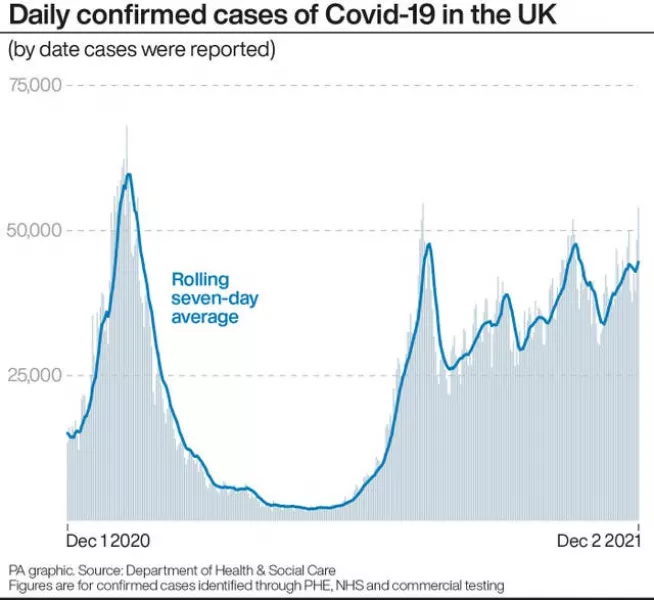The Omicron variant of coronavirus has “substantial” ability to cause reinfection in people who have previously had Covid-19, a study from South Africa suggests.
The research, which has not been peer-reviewed, found people who had tested positive for Covid could pick up the virus again.
It did not say how the variant will behave when spreading in a highly vaccinated population such as the UK, or whether the virus can evade the protection offered by vaccines against severe disease.
The new study estimated that the risk of reinfection for November 1 to 27, when Omicron was circulating, was 2.39 times higher than in the first wave of the pandemic in early 2020.
In contrast, the risk of reinfection in South Africa was lower in the Beta and Delta waves than in the first wave.
The findings suggest Omicron could cause a wave of infections in people with some prior immunity.
The researchers, from the National Institute for Communicable Diseases (NICD), looked at data from almost 2.8 million people with Covid-19 who had a positive test result at least 90 days before November 27.

Some 35,670 suspected reinfections were identified among the 2,796,982 people (1.2%).
The authors concluded: “Population-level evidence suggests that the Omicron variant is associated with substantial ability to evade immunity from prior infection.
“In contrast, there is no population-wide epidemiological evidence of immune escape associated with the Beta or Delta variants.
“This finding has important implications for public health planning, particularly in countries like South Africa with high rates of immunity from prior infection.
“Urgent questions remain regarding whether Omicron is also able to evade vaccine-induced immunity and the potential implications of reduced immunity to infection on protection against severe disease and death.”
Dr Abdou Salam Gueye, regional emergency director for the World Health Organisation’s Regional Office for Africa, told a press briefing there was concern about reinfections.
She said: “We monitor these reinfections (and) for the Beta and for the Delta wave we didn’t see an increase in reinfections over and above what we (would) expect when the force of infection changes when the wave stops.
“However we are seeing an increase for Omicron. And that speaks to the fact that in our population with a high seroprevalence – so where many people have had previous infection – we believe that their previous infection does not provide them protection from infection due to Omicron.
“However, hopefully it provides them with protection against severe disease, hospital admissions and death.”
She said the susceptibility of the population of South Africa “is greater now because previous infection used to protect against Delta and now with Omicron and doesn’t seem to be the case”.
But she added: “We believe that vaccines will still, however, protect against severe disease because we’ve seen this decrease in protection using vaccines with the other variants – the vaccines have always held out to prevent severe disease and admission into hospital from death.
“The same things that held true for the other variants, I think, to a large extent hold true for this variant.”
Professor Francois Balloux, from University College London (UCL), said the findings were not surprising given the number of mutations in the new variant. He said the research could not account for waning levels of immunity.
He added: “Risk of reinfection by the Omicron variant was estimated to be around three times higher than by the Alpha and Delta variant.
“The study is competently performed and highly timely as it provides the first direct evidence for the increased ability of the Omicron variant to partially bypass prior host immunity conferred by prior infection.
“The study does not provide any insight on the robustness of vaccine-induced immunisation against the Omicron variant. It also does not report any data on infection severity.
“South Africa has a low vaccination rate but a large proportion of the population has been infected during previous Covid-19 waves.
“The population of South Africa also tend to be fairly young with a median age of 27.6 years.
“As such, the results from this study are not directly portable to other settings such as Europe or North America, and more data will be needed before we can make more any robust prediction about the potential threat posed by a global spread of the Omicron variant in different parts of the world.”
Paul Hunter, professor in medicine at the University of East Anglia, said the study could not show whether Omicron was more infectious or whether it could escape vaccine immunity, though this was likely to some extent.
“The implications of this paper are that Omicron will be able to overcome natural and probably vaccine-induced immunity to a significant degree,” he said.
“But the degree is still unclear though it is doubtful that this will represent complete escape.
“The other big uncertainty is whether this increases the risk of severe disease, hospital admissions and deaths.”
He said that if case numbers increase dramatically then pressure on hospitals will also probably rise, adding: “It remains the case that the extra value of the booster vaccination dose remains the most important step that we can take to reduce the probability of severe disease.
“I suspect new targeted vaccinations will be developed against Omicron but if the infection spreads globally as rapidly as it seems to be taking off in South Africa then most of us may already have had the infection by the time a new vaccine is available.”







